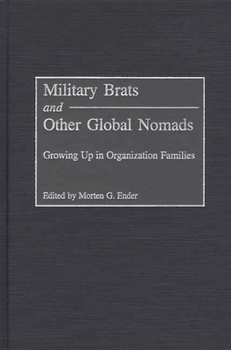Military Brats and Other Global Nomads: Growing Up in Organization Families
Select Format
Select Condition 
Book Overview
After World War II, American political, military, corporate, and humanitarian responsibilities abroad expanded greatly. With families in tow, government officials, military service personnel, business executives, and missionaries began to travel and live, in increasing numbers, outside of their home country. Other nations followed suit. Ender examines this legacy of the late 20th century and analyzes the social, psychological, and historical imprints on people who came of age in these service organization families.
Such international experiences impose specific demands on employees, their spouses and their children. These include relocation, risk of death or injury, family separation, and social controls on behavior. This collection contains thirteen essays by researchers studying children, adolescents, youth, and adults in a service organization family context, including the military, the State Department, international educators, and non-governmental organizations. The studies integrate research from sociology, psychology, child and adolescent development, family studies, and communications.Format:Hardcover
Language:English
ISBN:0275972666
ISBN13:9780275972660
Release Date:March 2002
Publisher:Praeger
Length:296 Pages
Weight:1.30 lbs.
Dimensions:1.1" x 6.3" x 9.4"
Customer Reviews
0 rating





